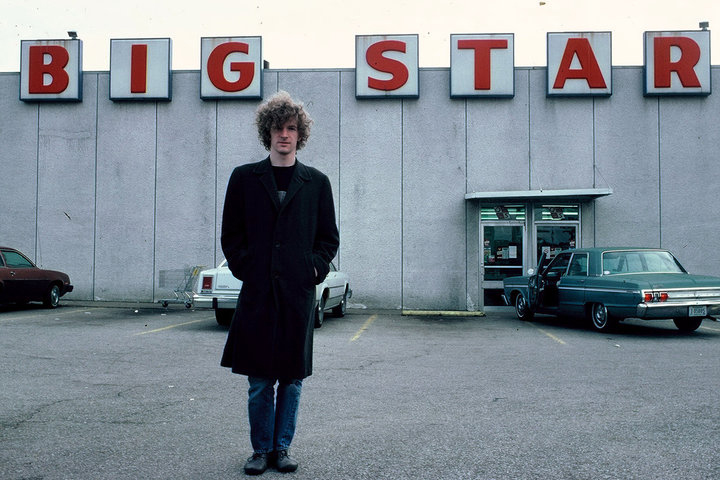RIP Scott Miller of Game Theory/The Loud Family 1960-2013. Archived: our 2011 interview about his final creative effort.

As the frontman of critically acclaimed 80’s and 90’s college rock vehicles Game Theory and The Loud Family, Scott Miller’s name quickly became synonymous with thinking people’s pop. Pithy, smart and nearly mathy in his mixing of the avant garde with earnest pop precision, he earned his stripes with comparisons to Big Star‘s Alex Chilton, but surpassed his influences by crafting his own genre of IQ rock, sporting songs with titles like “Top-Dollar Survivalist Hardware” and “Some Grand Vision of Motives and Irony” and increasingly unpredictable-yet-gorgeous arrangements on songs like “The Waist And The Knees” from Game Theory’s double-album masterwork “Lolita Nation.” While the legion of dedicated fans Miller attracted over his near 20 releases never seemed to turn into a legion of greenbacks, his singular vision kept him going through 2006 when he teamed up with pop hero Anton Barbeau for the anthemic “What if It Works?”
Surprisingly, Miller’s latest release is not one for your mp3 player or turntable, but for your kindle or bookshelf. In “Music: What Happened?” he shifts from behind the mic to before the page, painstakingly dissecting his favorite pop songs of the past 50+ years and creating one of the most formidable “best of” lists of all time. Like a big bag of potato chips, once the tome is cracked open it’s hard to put down, so be ready to read until your hands are greasy with thoughts on the relevance of various songs to the state of the world, and you’ve licked your fingers clean of the salty taste of agreeing, disagreeing, or simply being mesmerized by this wide ranging commentary.
From his home in the bay area, Miller made time to speak to Rocker about his new book and his long musical career.
_________________
ROCKER: So first off, “Music: What Happened?” is possibly the king of the rock lists books. Just an amazing accomplishment.
MILLER: Thanks, that’s an amazing compliment.
ROCKER: How did you first decide to compile a book of your musings?
MILLER: Right, it was supposed to be a column on the Loud Family web site, and Sue and Joe who run the web site eventually had the idea of making the column into a book. This was in the mid-2000s, when I did a question and answer column called “Ask Scott,” and at one point in (I think) 2007, instead of open-ended questions, I wanted to switch to a one-year project where someone requests a year every week, and I write about my favorite songs of that year. Sue and Joe also inspired the CD-length format, because I always eagerly awaited the best-of-year CDs they’d make.
ROCKER:Can you fill our readers in on the process of writing the book to the form it is in now?
MILLER: I’d been playing with the song selection for at least a year or two already. I started playing with iTunes and collecting songs from the eighties I didn’t have copies of. That was my pet project because the eighties were somewhat stylistically hopeless, yet there were little pockets of great material all around the margins. In the week before I’d write the entries for a year, I’d do listening tests. Some songs I’ll remember fondly, but if I actually had to sit through them, especially more than once, I realized one exceptional hook doesn’t always outweigh minutes of bad craft in the rest of the recording. When I sat down to write, it would usually be all at once, quickly, and with no more listening to the songs. That forced me to tell the truth more, because I was depriving myself of the option of listening again to invent new favorite details that were actually fabrications. The answers to why I liked the songs were up in my head. The writing task was to limit myself to that.
ROCKER: I know there is much made in Nick Hornby’s book/movie High Fidelity about men and their top 5 lists, so I am wondering if you are by nature a cataloguer of your thoughts?
MILLER: Yes, every now and then, I’m a typical representative of my sector of the population, and I ought to have the sense to capitalize when that’s the case. I’m not so much a natural cataloguer of my thoughts as a student of human valuation, where the evaluating human I have good visibility on is myself. I’ve been very passionate about music for a very long time, and I’m inclined to make a bit of a science of how those passions are really structured, and you can’t do that without taking some notes. The notes themselves are chaotic. If you looked at actual notes I make, you’d say the person who made these was hurried and getting a minimal thought down, not lovingly carrying out a hobby.
ROCKER: It doesn’t seem like you worked with an editor, would you have liked to or was it a decision not to use one?
MILLER: Bob Lloyd and Jeffrey Norman did a thorough proofing and some editing, and some other people contributed fixes to errors. Sue Trowbridge did some of what you would call editing. I wouldn’t have wanted someone to try to improve the ground rules for the format, because the form and the function were such a delicate personal balance, but I wouldn’t have turned down help with consistency, thesaurus decisions, and that kind of thing.
ROCKER: When you think front to end how long did it take to write?
MILLER: If I didn’t even have the accrued history of song selection, it would literally be year of full-time work, because that represents an enormous amount of screening and coming at the comparisons from many mental angles. The actual writing, which I would describe as working very quickly, was about three hours per entry, so about 150 hours to get the on-line versions up, and maybe that much again to fuss over the text, by myself and with others, enough to get a result that’s polished enough to actually ask money for.
ROCKER: Having spent most of your career as a musician did it feel awkward to be on the other side of journalism, writing about music? Had you done music writing as such before?
MILLER: Not really, no. I had a lot to say, for sure, but there were a lot of moments of becoming aware of needing a skill set that had to be sharpened then and there. One leg up, such as I have one, is that I’ve been reading and evaluating rock writing for a long time, so I had what you might call a deep instinct for what I wanted not to do. My most important positive role model might be Roger Ebert. Roger Ebert’s criticism has a special clarity, and it’s because he discloses his true reaction at some emotional risk. I knew I wanted to avoid replacing truth with, let’s say, piled up evidence of being informed and savvy, but that was usually an effort.
ROCKER: The book is both personal and in other ways criticism, I’m wondering if you had a hard time balancing those two poles. I think sometimes it is hard for people to strike the right balance between fan and pro but here you seem to have it down.
MILLER: Well, thanks, you’re too kind. Yes, I had a hard time getting a balance, and really my only method was writing a paragraph, recognizing that it was a piece of crap, recognizing why, then deleting it and trying again only this time saying something I really felt instead of something it seemed like I should be feeling.
ROCKER:Once completed, did you ever look back and think “Oh damn, I should have included…” or reflect on the idea that you should not have included someone else?
MILLER: Surprisingly, not that much, but some. I don’t think I actually regret any inclusion, but of course I haven’t heard all one hundred thousand songs released every year, so there’s a steady stream of discoveries of omission through ignorance, especially in recent years. I think “ 24-25″ by the Kings of Convenience would have been in 2009 somewhere if I’d known about it a couple of months earlier. In a way it’s a miracle I somehow know about as many songs as I do. There are always something like two great songs I didn’t know about, but never ten. That can only be a testament to the power of word of mouth and some consistency of aesthetics.
ROCKER: Did you put any thought toward “I should ensure the songs/artists I talk about are ones people know” (for instance, I was surprised to see Hanson’s “Mmm Bop” recounted) vs. “although these songs/artists are obscure I am going to include them” (say, my complete agreement on your love of Sparks’ “Kimono My House” record)
MILLER: All right, a Kimono My House fan! That album sustains an incredible stretch of high quality music, especially considering the whole rest of their career is erratic. I felt just about zero pressure to reward well-known songs, and some pressure not to include those. The great reward is finding like-minded listeners for songs where at the time of writing, for all you knew not another soul in the world liked them. If no one knew “Mmm Bop” existed, it would be a ton of fun to discover it, whereas given reality, at least a third of my audience will think it’s a lame inclusion. But I flatter myself that I’m pretty good at sticking to what my ears are actually telling me.
ROCKER: The title of the book poses the question “What happened?” and I’m wondering if you feel that after writing this book you can answer that question, or with the title are you more saying definitively to the reader “(Here is) what happened” ?
MILLER: In the spirit of that second part, the hope is that I’ve posed a question that could be taken a number of ways, and provided a satisfying range of answers.
ROCKER: Rock music is a genre that appears to be (wrongly) discounted from serious study. For instance, if your book was “Haydn: What Happened?” or “Billie Holliday: What Happened?” it could be considered scholarly, but with rock that seems more unlikely. The irony of this is rock music is to today, what classical music was to its the late 1700’s – the popular music of the time. I’m wondering if as you contemplated rock music of the past 50 years if there were insights you gleaned about movements in music / the world / popular culture and also if there were things you gleaned about yourself and your own life?
MILLER: Unquestionably I was trying to tell a story about all those things. I tended to put the explicit story arc stuff in the first entry of each year, but there were plenty of other patterns of waxing reflective about social and political trends, technological advances and disasters, and tsunami level events like the Beatles. I’m the wrong person to claim to be able to evaluate pop music as possibly being as sophisticated as classical in certain ways, but speaking of tsunami level events, I’ve become a little intrigued by the early 1800’s, Beethoven’s time, when Europe was so completely obsessed with Napoleon.
ROCKER: For fans of your music, I think the last we heard from you was 2006’s “What if It Works?” CD which you did with Anton Barbeau, is there more music in your future or do you see more writing? A bit of both? Neither?
MILLER: The good thing about writing is I can just up and do it, solo, whereas I don’t really do solo music. I collaborate with other musicians and I like to do basics in a real studio. I don’t foresee being able to get the time, money, and coordination happening, but I keep wondering if there is some clever way to pull it off.
ROCKER: Is it hard to be away from making music after having done it for so long?
MILLER: It is hard, yes. To the extent it was actually a decision to take a break, it was because I just got dead tired of promoting myself. If people want to listen to 19-year-old autotuned oversouling, it’s beyond stupid and humiliating for me to try to somehow shove to the front of that line, you know? Actually, Sue and Joe at 125 Records were just kind enough to get my acoustic 12-string repaired, so it feels like a shame not to start taking it out and seeing if something pleasant sounding doesn’t result. So I have been fooling around a bit just lately.
ROCKER: Do you see another book in your future? Is there anything you’re working on now?
MILLER:I’d like to write a book that tries to synthesize spiritual thought and rational thought into a coherent logic. It’s actually close to the problem of finding criteria to compare pop songs at different extremes of mental ambition. In both cases, I feel like everyone in the world thinks it’s always a matter of comparing apples and oranges, and I’m always the one who thinks that it’s not, it’s completely fine to compare oblique approaches. John Cage and the Ramones are for normal human listeners, it’s not like the same person literally can’t understand both, like you’d actually have to be a university professor for one and a high school dropout for the other. In the same way, one day people will be Mr. Science-is-all-there-is, spirituality was invented by a manipulative priesthood, and in another context they’ll turn into Yoda, and Western rationality is a composed consensus reality, and you’ve got to let go of your uptight structured outlook, and speak from the heart, not the head, and all of that. But the two just literally don’t acknowledge each other, and there really needs to be a book to get the two halves of the same person out in the open and communicating.
ROCKER: Was there ever a time when you thought you’d leave the music world behind, or where you look to a future and think “nah”? Or do you think that there will never be a future for you minus rock music?
MILLER:Well, as you know, you can get a deep love for music into your system, but it’s a brutal business. I still feel like I’m trying to fake my way in.
____





Pingback: WIN COOL STUFF FROM ROCKER MAGAZINE! | Rocker: The Lifestyle Magazine for Mature Hipsters()
Pingback: Scott Miller – R.I.P. | Nerds Attack!()